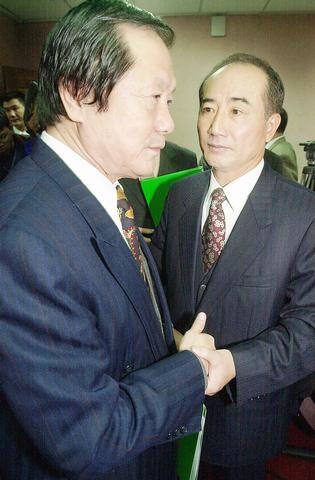With the legislature to elect its speaker and vice speaker today, rival camps made last-ditch efforts yesterday to consolidate support for their candidates amid rumors of defections.
All parties have required their members to cast their vote into separate ballot boxes today to ensure their loyalty.
Incumbent Speaker Wang Jin-pyng (

PHOTO: CHEN CHENG-CHANG, TAIPEI TIMES
He remained mum on whom he preferred as his deputy, though the DPP and the Taiwan Solidarity Union had called on him to take a stand.
At Wang's request, the KMT canceled its weekly Central Standing Committee meeting Wednesday. He termed the move as a "goodwill" gesture to the DPP, which will be the largest party in the legislature.
Analysts say that by calling off the meeting the KMT hinted that members are not bound to vote for the party's vice-speaker candidate Chiang Ping-kun (江丙坤), as he failed to win the official nomination.
Departing from past practice, the main opposition party does not make any threat to punish uncooperative members.
Yesterday evening, KMT Chairman Lien Chan (連戰) personally hosted the party's legislative caucus meeting in which he urged some 60 lawmakers present to throw their support behind Chiang.
"Every single vote counts," Lien told the caucus. "Let's treat the elections of the speaker and vice speaker as an integral campaign." Up to 10 KMT legislators are said to favor DPP candidate Hong Chi-chang (洪奇昌) for vice speaker.
Liu Cheng-hung (劉政鴻), one of the alleged defectors, told reporters he would not make a final decision until Wang secured the speakership. The legislature will elect the speaker in the morning and the vice speaker in the afternoon.
The DPP, itself plagued by the specter of internal revolt on the matter, decided during an eleventh-hour meeting not to challenge Wang. The caucus passed a resolution that binds fellow lawmakers to "technically display" their vote before inserting it into the ballot box.
Incoming DPP legislator Chiu Chang (邱彰) protested the decision as compromising the dignity of the nation's highest lawmaking body.
"How can we expect average citizens to abide by the law when lawmakers take the lead to mock the rules," she said.
Internal election rules bar the displaying of ballots, though members are able to circumvent the regulation through subtle violations.
About five DPP legislators are said to withhold their support for Hong, according to a DPP lawmaker, who asked not to be named.
For his part, Hong went ahead and sought backing from colleagues across party lines. In the evening, he called on independent legislator-elect Sisy Chen (
Chen has made clear her intent to vote for Chiang, while other independents stayed tight-lipped over their voting decisions.
The People First Party, which on Monday entered an alliance with the KMT, also convened a caucus meeting last night in the hope of defusing defection attempts by cash-strapped members.
Scores of lawmakers from all parties are believed to have accepted payments as high as NT$30 million from one camp or the other in exchange for their support.Also See Story:
DPP has yet to decide on supporting Wang

SECURITY: As China is ‘reshaping’ Hong Kong’s population, Taiwan must raise the eligibility threshold for applications from Hong Kongers, Chiu Chui-cheng said When Hong Kong and Macau citizens apply for residency in Taiwan, it would be under a new category that includes a “national security observation period,” Mainland Affairs Council (MAC) Minister Chiu Chui-cheng (邱垂正) said yesterday. President William Lai (賴清德) on March 13 announced 17 strategies to counter China’s aggression toward Taiwan, including incorporating national security considerations into the review process for residency applications from Hong Kong and Macau citizens. The situation in Hong Kong is constantly changing, Chiu said to media yesterday on the sidelines of the Taipei Technology Run hosted by the Taipei Neihu Technology Park Development Association. With

CARROT AND STICK: While unrelenting in its military threats, China attracted nearly 40,000 Taiwanese to over 400 business events last year Nearly 40,000 Taiwanese last year joined industry events in China, such as conferences and trade fairs, supported by the Chinese government, a study showed yesterday, as Beijing ramps up a charm offensive toward Taipei alongside military pressure. China has long taken a carrot-and-stick approach to Taiwan, threatening it with the prospect of military action while reaching out to those it believes are amenable to Beijing’s point of view. Taiwanese security officials are wary of what they see as Beijing’s influence campaigns to sway public opinion after Taipei and Beijing gradually resumed travel links halted by the COVID-19 pandemic, but the scale of

A US Marine Corps regiment equipped with Naval Strike Missiles (NSM) is set to participate in the upcoming Balikatan 25 exercise in the Luzon Strait, marking the system’s first-ever deployment in the Philippines. US and Philippine officials have separately confirmed that the Navy Marine Expeditionary Ship Interdiction System (NMESIS) — the mobile launch platform for the Naval Strike Missile — would take part in the joint exercise. The missiles are being deployed to “a strategic first island chain chokepoint” in the waters between Taiwan proper and the Philippines, US-based Naval News reported. “The Luzon Strait and Bashi Channel represent a critical access

Pope Francis is be laid to rest on Saturday after lying in state for three days in St Peter’s Basilica, where the faithful are expected to flock to pay their respects to history’s first Latin American pontiff. The cardinals met yesterday in the Vatican’s synod hall to chart the next steps before a conclave begins to choose Francis’ successor, as condolences poured in from around the world. According to current norms, the conclave must begin between May 5 and 10. The cardinals set the funeral for Saturday at 10am in St Peter’s Square, to be celebrated by the dean of the College